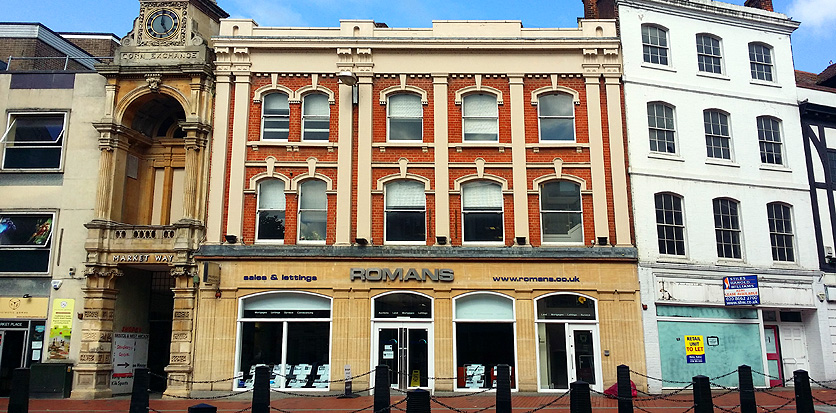 |
 |
|||
|
Notable amongst the large wholesale houses and merchants of late Victorian Reading was the firm of Messrs. Salmon and Son, tea merchants. Mr. Joseph Smith Salmon (1821-1907) came from Barkway, near Royston, in Hertfordshire and, in the 1840s, set up a grocery and wine merchant's at 5/6 Broad Street (now Ecco Shoes). About 1849, he transferred the business to No 1. Butter Market (now Munchees Café) and it was here that his eldest son, Joseph Smith Junior (1846-1896), became seriously ill with scarlet fever. This, unfortunately, left him deaf from the age of eight. About 1860, the shop moved ten doors along to the very grand 33/34 Market Place (now Romans Estate Agents). Joseph Senior was agent for the wine & spirit merchant, W & A Gilbey, and the brewer, Allsopp & Sons, and employed three male shop assistants as well as his two sons, Joseph and George. The business did so well that the family no longer had to live above the shop and had a private family home elsewhere in the town. In the mid-1870s, Mr. Salmon brought his eldest son, Joseph, into the business as J. S. Salmon & Son, and began to concentrate on tea sales. As trade developed, the business soon outgrew the capacity of the Market Place retail premises. A spacious warehouse therefore had to be engaged at 41 Queen's Road to house the wholesale stores and packing department. Before 1881, the other parts of the grocery business were dropped, although the wine agency remained. The fame of Salmon's blended teas rapidly spread far and near, and the enterprise of the firm determined them to place their teas on the market in whatever part of the country there should prove to be a demand. By the mid-1880s, Salmon's Teas were available in most of the towns in Southern England. This continued steady growth of business enforced a second migration of the warehouse around the same time - on this occasion to large premises at 218 King's Road, on the corner of Montague Street (now opposite Reading College). The property had previously been a brewery belonging to the firm then known as the Berkshire Brewery Company. Rarely is there to be found so striking an evidence of the triumph of teetotal over alcoholic beverage as the conversion of large brewery premises into a tea warehouse and factory. Production here was so successful that, by the early 1890s, when Joseph Senior retired, expansion elsewhere was even contemplated. Despite his deafness, Joseph Smith Salmon Junior continued to run the highly successful family business from its dual locations. He was generally a man of a very jolly disposition, but, unfortunately, suffered from unbearable boats of tinnitus. He had been known to speak of suicide and, sadly, was found drowned in the Thames, near Tilehurst Station, on 12th August 1896. Soon afterwards, the Salmons divided their business into Salmon's Tea Merchants in the Market Place and Salmon's Printers, paper bag works & paper merchants, in the King's Road. In 1902, King's Road was renumbered and 218 became 256. In the same year, Salmon's Printers was purchased by Arthur Brooke, of the Brooke Bond Tea Company. He used the premises for tea packing and label printing, renaming it the Berkshire Printing Company after the adjoining pub. The Tea Business, reduced in size, continued in the Market Place under Joseph's brother, George Rand Salmon (1847-1917), although he seems to have been little involved in earlier years. When he died in 1917, the business appears to have been wound up, although the Salmon's Brand was apparently continued Brooke Bond into the 1930s and beyond.
For more information on the Salmon family, read H Dominic W Stiles'
article, “One of the jolliest of
men, tinnitus, & a tragic suicide”
|
|||
| © Nash Ford Publishing 2015. All Rights Reserved. | ||||





